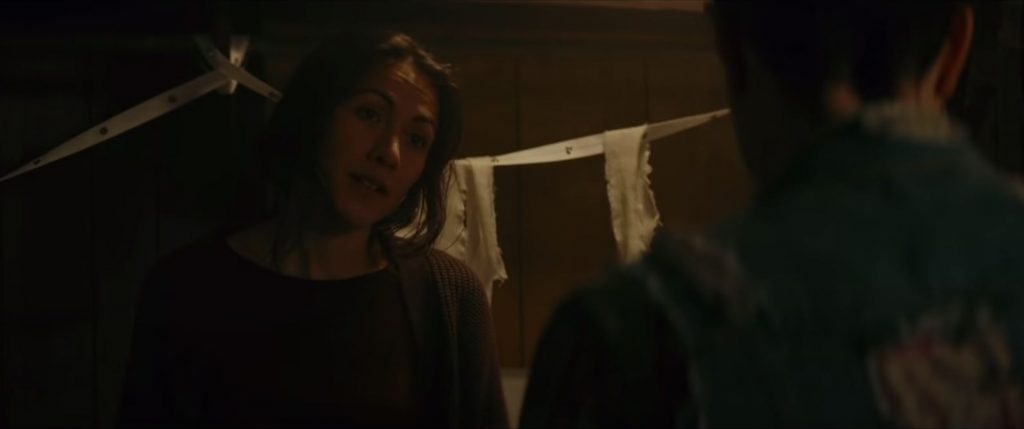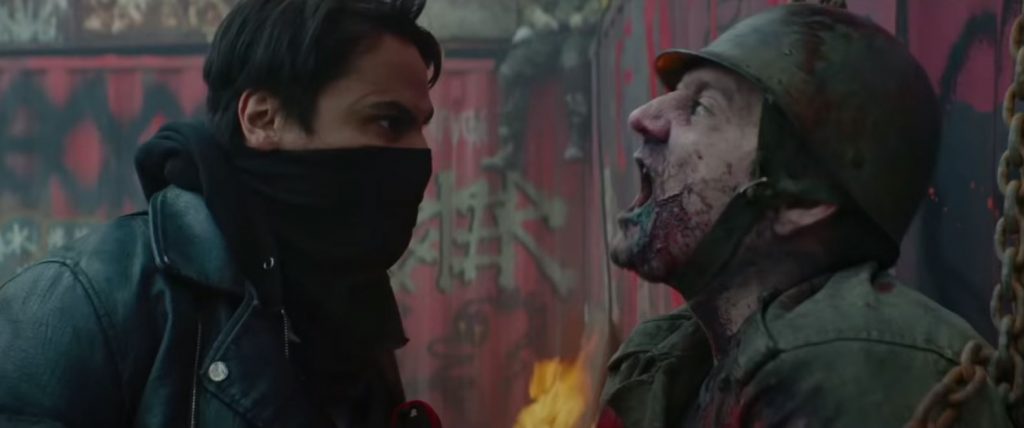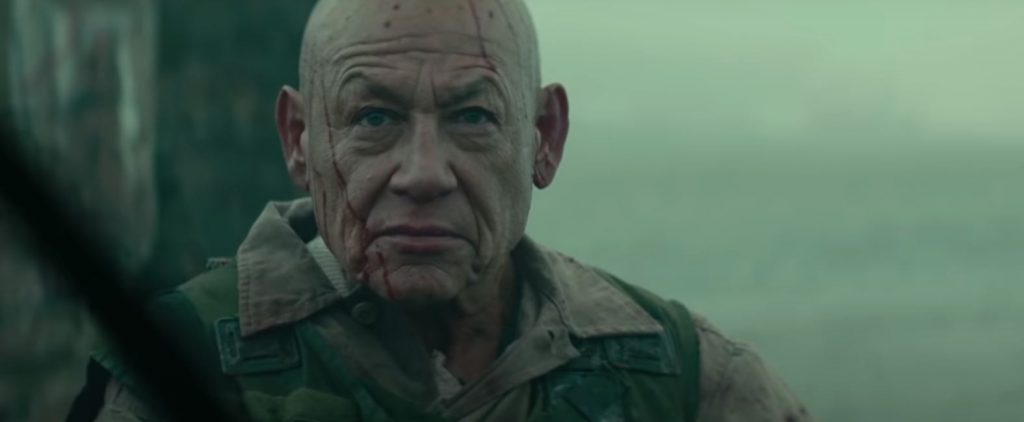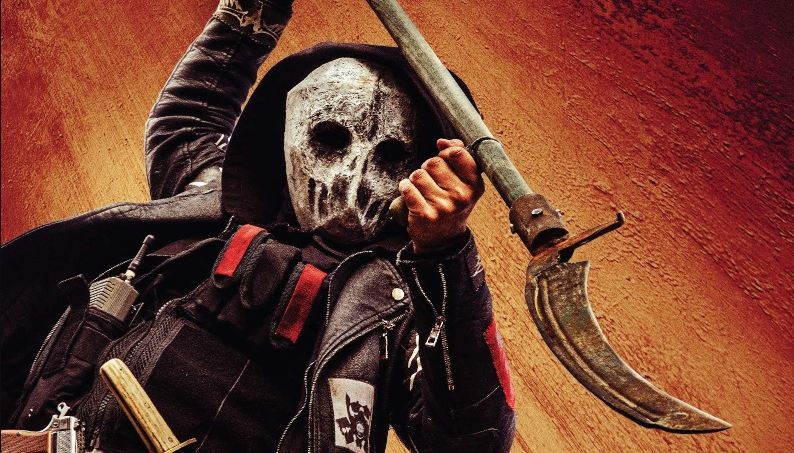The best films of the zombie genre are the ones that use the metaphor of reanimated corpses to subtly comment on different aspects of humanity and society. Following in that tradition of social commentary wrapped up in gore-soaked tales of undead mayhem is the film BLOOD QUANTUM. Its story is one where the dead have started coming back to life outside the isolated Mi’kmaq native reserve of “Red Crow” in Nova Scotia. The indigenous inhabitants of the area are strangely immune to the outbreak though and now they have to band together to survive the end of life as we know it and determine who they will try to save from outside their ranks as the world crumbles around them.
BLOOD QUANTUM is the brainchild of Mi’kmaq native filmmaker Jeff Barnaby. It deftly speaks to issues of trauma, colonialism, isolationism, drug abuse, and other issues that affect countless indigenous people in North America. It does all that though while still being an expertly crafted genre film filled with action, scares, and (of course) lots of zombie gore.
I recently had the chance to sit down with Jeff Barnaby and, his lead actress from the film, Elle-Maija Tailfeathers to talk all about BLOOD QUANTUM ahead of its release to DVD/Blu-Ray, Digital HD, and VOD this week after having been previously only available the past few months as a SHUDDER streaming exclusive.
*Note: This interview contains mild spoilers for BLOOD QUANTUM.
______________________
What was the genesis of BLOOD QUANTUM?
[Barnaby] – I wanted to make a zombie movie and I didn’t feel like a straight zombie movie would play. I needed to do something different. I felt like just the idea of having Natives wasn’t going to be enough and I kind of leaned into the political history of social protest like the original NIGHT OF THE LIVING DEAD and DAWN OF THE DEAD where they actually meant something in addition to being kind of schlocky and gory horror films.
I came up with the idea of just making the making Mi’gmaq immune, to the zombies and it’s weird because as I sit here and explain it I actually came up with the idea quicker than it took me to just explain that sentence. [laughs] It’s like I was saying it as I was coming up with it, my producer asked me, “What do you want to do next?” I was like, “Let’s do a zombie movie” and he said, “Everybody does zombie movies.” I immediately said, “What if we make them immune to the zombie plague?”
From that point on, all of the dots connected in terms of how it was going to play out and how it would manifest as a retelling of colonization. Like LOOK WHO’S COMING TO DINNER but with zombies. It was just that really… just that simple.
How did you get involved, Elle-Máijá?
[Tailfeathers] – Well, I’ve watched and admired Jeff’s work for years. He created some really powerful short films, and then his first feature film, RHYMES FOR YOUNG GHOULS, was a really important moment for indigenous cinema in North America. And so when my agent sent me the audition for this, I jumped at the opportunity to work with Jeff because I admire his voice and I think that he creates really moving, unique and powerful stories for the screen.
Jeff did a fantastic job of writing my character. She, to me represents so many indigenous women I know within our community who are doing such important work quietly in the background and holding up our communities in so many ways. And I think Jeff is very aware of these women and the role of indigenous women in terms of upholding our communities and our nations.
[Filmmaking is also] a tough industry for people of color, indigenous people, and women. And so I started making films almost 10 years ago [as a director myself], and so now when I choose an acting role, my experience as a director certainly informs the choices I make and I think it provides a really unique working relationship with other directors. And I just loved the process of being able to work with other indigenous directors and to collaborate on that sort of creative level. And so, a big part of my decision to work on this project was the opportunity to work with Jeff and to watch him work.

One thing that struck me about BLOOD QUANTUM, was the idea of “generational trauma”. How the tragedies and abuse endured by previous generations continues to affect future ones. Can you talk a little bit about how that idea informed the script and the entire process of creating the film?
[Barnaby] – I don’t really think about it like that. I think that’s one of the weird things about my film career is that those comparisons keep getting made and it’s not like I don’t put them in the screenplay, I did, but I don’t try to make them the focus. You’re never going to see natives in my films that are hustlers or victims or subject to any kind of pity porn that you typically see when you’re dealing with native people like, “Oh, look how sad their history is.”
I’ve never really done that. I’ve always kind of reinvented that history to manifest strength, the idea that, “Yeah. That was a tragic history but we’re still here, we survived the apocalypse” and that really became the focal point of the film and to a certain extent my first film. It wasn’t like, “Look at this traumatic history.” It was like, “Look at what we survived and what it prepared us for”, this idea that we are a post-apocalyptic culture and we are able, better able than almost any culture, to move forward.
[Tailfeathers] – Absolutely. I see it as hope because I think that’s how we have to see it. And I think about what has gotten us through all of that ugly history and that ongoing legacy of colonialism and it’s love and hope. …I certainly hope that audiences walk away with the understanding that indigenous people have been deeply impacted by this history and legacy of colonial genocide and that that legacy is ongoing, but that it’s important to recognize that our communities are strong and alive and love and hope thrives within our communities.
[Barnaby] – There’s some criticism that says, “Well, the movie’s not really scary” and it’s, well, because the natives aren’t scared. It’s because they’ve gone through it all before and they’ve been preparing for this pretty much the entire time colonization has been in effect; capitalism has been in effect. It’s never really stopped.
The idea that native people are prepared for violent opposition that consumes everything in front of them, especially when I say it like that. The metaphor has become paper thin and you kind of start getting hit in the head with a shovel. When you start really digging past the initial concept, you start seeing a lot of nuances and you start seeing more of a focus on the modern day Indian and when you talk about post-colonial Indians you talk about lifestyle, this anger, and it seems really almost displaced in the film if you don’t know that history.
There’s a lot of dealing with audiences that don’t know their own history, don’t know the meaning of the term “Blood Quantum” and it’s like “how do you not know that?” It’s a colonial concept. It’s on the Declaration of Independence. Again, you’re talking about a population that’s really been conditioned to look at natives a certain way, specifically, by film and television so when we see a native up onscreen he’s either the villain, the victim or some kind of symbol of talking to nature, trees, talking to raccoons, that kind of stuff. My experience growing up on a reserve was typically completely at odds with what’s being shown in mainstream media.

Genre films like this can be “Trojan horses” for populations who wouldn’t necessarily be aware or cognizant of what indigenous people are going through.
[Barnaby] – I like that analogy! I call it like “Mr. Miyagi-ing the audience”, right?
[Everyone laughs]
[Barnaby] – “Why am I washing this car?” ‘Cause I’m teaching you something, fool. That’s exactly what it is.
The film has been streaming on SHUDDER for a few months, so I feel like we can talk a little about the last shots of BLOOD QUANTUM. They are ambiguous in a way. So, what do those moments mean to each of you?
[Tailfeathers] – That final note, for me, is all about love and hope because that’s what got us here and got us through all of that tough stuff.
[Barnaby] – When we put it on paper it was the idea of carrying forward these two different cultures and to the future being guided by the person that navigated the path up until that point and survived and that’s the mom… the grandmother at this point, which are huge figures in my culture and my own life. Both my mother and my grandmother were huge influences on me. That’s really what you’re getting when you’re looking at this person … gliding off into a future that who knows what’s going to happen? It’s a mix-up of a lot of these different ideas but it is meant to be hopeful.
The main idea, if you come away with anything, is that in order for us to survive we need to do it together and there needs to be a reckoning with our history that native people have been having … It’s a mandatory directive to live with this history in order to survive in the present. There’s no two ways about that because it’s just everywhere. There is no science fiction in Mi’gmaq, there’s no television shows in Mi’gmaq. This is a completely colonized culture. It’s a form of white supremacy.
When you talk about that, you need to understand as a white person how you’ve been dictating the culture this entire time and you look at what’s going on now with the racial upheaval, I think you’re looking at a group of people in non-natives, white people, who do not want to come to terms with that. Do not want to become terms with slavery, with genocide, with mass incarceration, all the stuff that’s been ear markers of colonialism up until this point and everybody wants to Make America Great Again or Take Back Canada. What are you talking about? When has that ever happened? When has America ever been great? If you actually stopped and looked at it.
When I talk about the ’50s after the war and it’s the beginning of the Jim Crow era, like segregation, is that what you’re talking about? Everything that you talk about in terms of history has all been a goddamn tragedy for anybody who isn’t white.
You’re starting to see colonialism become colorblind whereas we’ve already chewed up all the minorities. Let’s start on the … It’s kind of morphed into classism to a certain extent where now you’re starting to see white people, basically because of the Corona virus, being treated the same way native people and Black people and people of color have been treated for hundreds of years and just looking for anything to blame but the culture that they have put in place, which has completely been built on exploitation.

It seems like this is almost the perfect time in history for BLOOD QUANTUM to be released.
[Barnaby] – It’s weird that it has come out when this virus kind of brings all these ideas or all these inequalities into the foreground of our culture because disease was the very thing that ushered in colonialism in the first place. It wasn’t like all these great warriors going to battle with native people, which is what history has painted it as. It was like people passing out smallpox blankets to children. There’s no great warriors here. They were fighting a starved, disease-riddled people, and all they really needed to do was wait. The other flip side to that is starving out the resources, killing buffalo. Which in this case it was the first thing you see in the film, which is salmon for the Mi’gmaq people. Salmon being turned against them.
It was all meant to be a mirror of colonialism and the weird thing is when we got hit with this virus, it almost becomes the same set of circumstances in the sense that everybody is sick of colonialism, which is what capitalism is. It just using a different name. That’s exactly what it is. It is a system that’s based on exploitation of minorities and the poor. You’re starting to see it come apart via the virus because, again, all those inequalities have been pushed to the foreground and you can’t really ignore it anymore.
I completely agree. As we start to wrap up, what was your favorite aspect of making the film?
[Tailfeathers] – Oh, I had so much fun working on this film. The cast was incredible. It was just such a blessing to work with such a large indigenous cast. And, the film is about such heavy subject matter, but I think whenever you get a group of indigenous people together, there’s going to be so much laughter because that’s something that we’ve developed to survive is just the joy of laughter and humor. And so I just had such a blast laughing every day on set between takes and then also just having really deep generative conversations with the other actors was fantastic. And then just the wackiness of watching all of the pieces that fit together to make a film like this in terms of special effects and makeup and everything. It was such a joy to make this film.
One of the most enriching parts was the language aspect. So, we were speaking Mi’gmaq language in parts of the film and I’m Blackfoot and Sámi. So, It’s not my language, but it was a huge challenge to learn how to speak a language. I mean, we obviously didn’t learn the whole language, but we learned our lines and what it meant and having to fit those sounds into your mouth that are so unfamiliar. It was really challenging. But I have to say that when we went to Jeff’s community, we had an opportunity to go to the school there and meet all of the children from that community who were learning the language. And it was such a powerful moment to be able to go into the community and see five, six, seven-year-olds learning their ancestral language and just the joy and love that exists in that community was so inspiring. And it made me feel so much more determined to get the language right. It’s a lot of pressure.
Well I’d say, as a viewer and an outsider, I greatly appreciated that. It is a detail that could so easily be glossed over to make it more palpable for audiences, but it’s such an important thing. I appreciate the effort that went into that because it goes a long way to making the film feel “lived in” and that comes across on screen. What was your favorite aspect of making the film, Jeff?
[Barnaby] – Doing the music. For me, music is a very emotional expression whereas filmmaking can become quite technical, particularly, the way we make films where there’s a lot of gags and gore to worry about, there’s CGI that needs to blend well with everything but music is just me playing keyboards or the drums or guitar and capturing the emotion that I see on screen. A lot of that soundtrack was me performing live. There was no retakes. We didn’t have the time. I pulled that out of my ass in about two weeks or something like that and we recorded an album basically. It was an hour long and it was like …
That was really the best part of it for me. That’s when everything comes together and you start seeing it come together. I was worried about it because I was so burned out by the time we got to that point that I could barely function. Being able to do the music in a way that was meaningful and it wasn’t just me slapping down notes on a piece of paper or a soundtrack. It was, in a lot of way, decompressing for me. Being able to do the soundtrack in a way that I was able to play all the sounds … I was able to play all the instruments.
This was the first time that I had ever incorporated native traditional music. I think we ended up using the … Man, I’d have to go back and look but we used Mi’gmaq songs in the soundtrack, which really meant a lot to me. It was real culture earmarks, not only to the present but to the past, as well. It became another layer to the film that really you’re only going to get if you’re from Nova Scotia or Mi’gmaq but you recognize the music as being native. If you’re Mi’gmaq, you’ll recognize the lyrics. There was the grandfather’s song, for example, that was like a “you honor your elders”-type song. The song he sings when he makes that heroic stand towards the end. It really meant something.
__________________
BLOOD QUANTUM is now available on DVD/Blu Ray and all digital platforms. It is also available to stream on SHUDDER.




